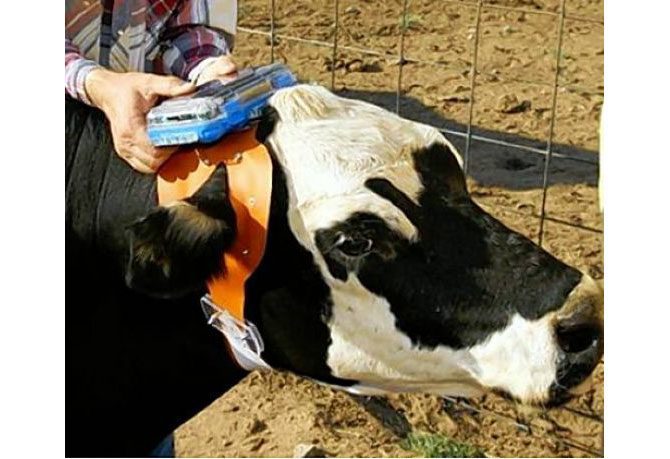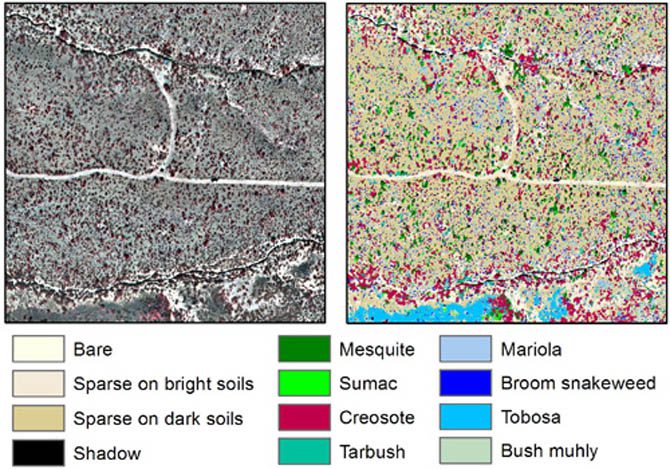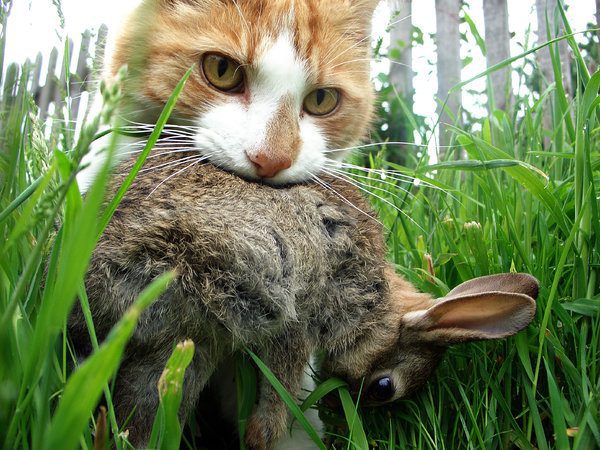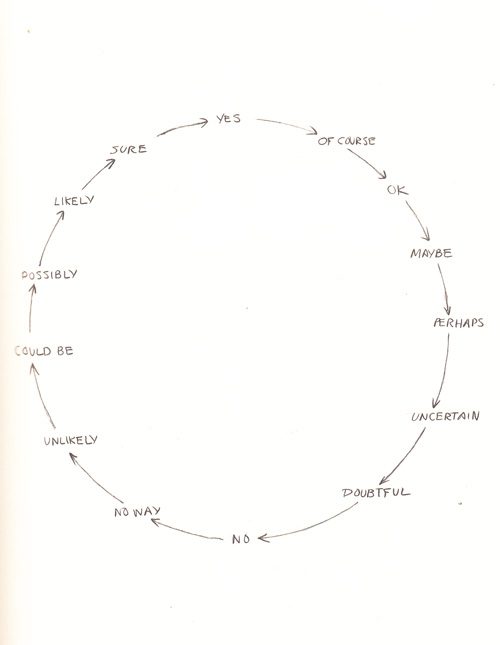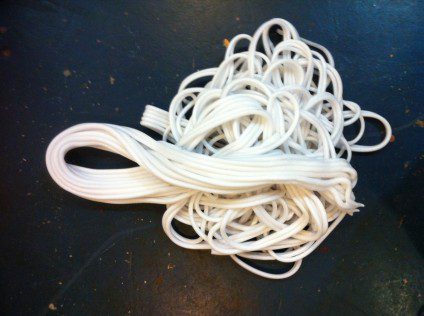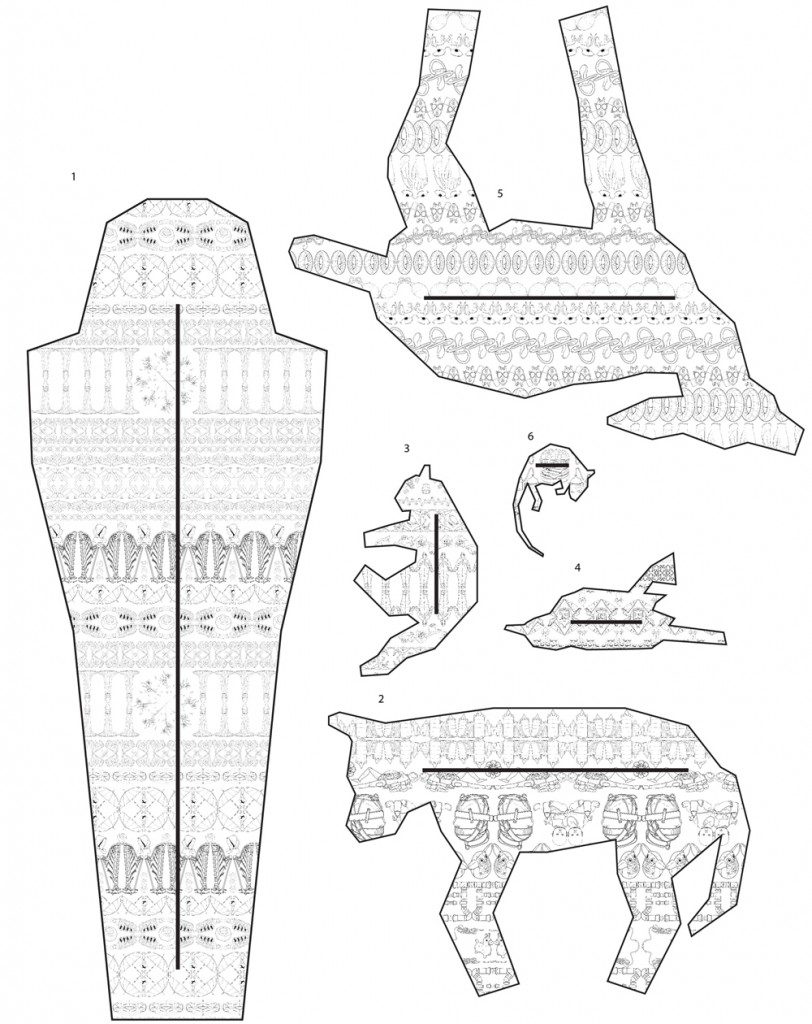Research Journal
-
February 7, 2013
Virtual fencing, and the new aesthetic
This just in from Venue, an online mag produced by StudioX.
INVISIBLE FENCES: AN INTERVIEW WITH DEAN ANDERSON(10 gallon) hats off to Studio-x for mixing urban and non-urban considerations of architecture.
I’ve been ruminating (yes) about how to better interface with and represent ecocritical investigations on remote public lands, and have the work BE more salient to an urban public.
I sometimes (often) get blank looks if I talk about the fact that we all own the USA’s public land.
So much real and symbolic action takes place on this vast area (over 95,000 square miles) of high plains and high desert*.In response to the interview about virtual fences, I’m thinking about
– at what point in the interview Anderson (and interviewer) mentions animal welfare – not until midway or later in article, certainly framed as secondary or even an after thought
– how easy it is to privilege convenience and human progress, continuing to make animal welfare second to your priorities (if that)
– looking at Anderson’s enthusiasm about technology controlling our literal actions (and not even in the future, right now, how that’s leading us)
– cows are ‘handed’ (left and right) as we are. They can recall where virtual fences were (because they experienced unpleasant feedback to approaching theses zones)
– question: to surveille the animals via drones and electronics performs what in relation to control of human biopower?
– can one *really* fence off poisonous plants (a single one?)?
– can the drone birds be sent to frighten off wolves and lions and bears (oh my)?
– can songs be sung for other purposes across that landscape, like Anderson does in the cows’ ear pieces?
– the ‘new aesthetic’ privileges a remote sensing of the world, acknowledging the ever-decreasing direct apprehension we have or are interested in having (what are we doing with all that time we gain?)
– the ‘new aesthetic’ takes non-critical pleasure in surveillance, distance, and the production of accidental wonders. how does this operate with real animals (and real meat and money) at the end of the line?
– the positive impacts of the virtual fencing are great: ease of moving livestock away from riparian areas and depleted landscapes, away from predators, away from wild herds, removal of hard fencing helps wildlife’s mobility.
– remote sensing from drones (robo birds) can tell you a detailed story of the current conditions of the landscape:
Christie Leece (my collaborator on Gila 2.0) and I are trying to figure out next steps — hopefully in Arizona.
On a related note, basal ganglia controlled (like the robo rat in the Anderson article) in mice is featured on Radiolab:
Damn It, Basal Ganglia*The North American Deserts includes all the deserts located on the continent. It is also the term for a large U.S. Level 1 ecoregion (EPA)[1] of the North American Cordillera, in theDeserts and xeric shrublands biome (WWF). The continent’s deserts are largely between the Rocky Mountains and Sierra Madre Oriental on the east, and the rain shadow creatingSierra Nevada, Transverse, and Peninsular Ranges on the west. The North American xeric region of over 95,751 sq mi (247,990 km2) includes: 3 major deserts; numerous smaller deserts; and large non-desert arid regions; in the western United States and in northeast, central, and northwest Mexico.
(wikipedia) -
January 29, 2013
Are domestic cats an anthropogenic force (of destruction, and is that redundant)?
Tags:From the NY Times today
Fluffies that spend part of the day outdoors and the unnamed strays and ferals that never leave it — kill a median of 2.4 billion birds and 12.3 billion mammals a year, most of them native mammals like shrews, chipmunks and voles rather than introduced pests like the Norway rat.
The estimated kill rates are two to four times higher than mortality figures previously bandied about, and position the domestic cat as one of the single greatest human-linked threats to wildlife in the nation. More birds and mammals die at the mouths of cats, the report said, than from automobile strikes, pesticides and poisons, collisions with skyscrapers and windmills and other so-called anthropogenic causes.
-
-
January 12, 2013
Petrochemical Self-Assessment form
Tags:I have an exhibition at bitforms gallery in New York through Feb 15, 2013.
It is my first solo show at the gallery, and a further development of “Necrocracy,” the work I began at Diverseworks in Houston, Texas, as a commission in March 2012.New work includes a Petrochemical Self-Assessment Form, as well as a series of body bags for humans and companion animals.
I’ve posted the Petrochemical Self-Assessment Form here.
If you are interested, please empty your pockets and examine your hang tags, and fill it out.
Then you can
a> mail it back to the gallery, or
b> scan it and email me at marina at o-matic dot comDownload:
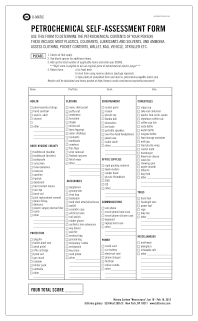
Download the Petrochemical Self-Assessment Form (pdf) -
December 31, 2012
The amazing world of regrind, floor sweep, and purge
Tags:The lovely Marcia Sardy Schofield wrote this account of our trip 2 days ago to Long Island to pick up some purge and regrind.
My endless gratitude to her for helping to locate said exotica, and for supplying wheels to boot. She and her equally delightful and eccentric husband Richard are both doctors in the UK, and seem to relish becoming tangled in these quests (last year Richard came on a knotweed hunt with Abigail Simon and me).+++
Please Recycle.
I can let you have maybe 75, 100 pounds of regrind, but I don’t have any floorsweep…
Is it virgin, or contaminated mix? I ask.
Some virgin, some recycled…
Which is how I found myself driving on the LIE for 3 hours on a Friday before New years Eve.
Marina is my oldest and dearest friend- I would do anything for her. Including sourcing 300 pounds of recycled plastics pellets to fill Tyvek bodybags designed to hold cattle, wolves, humans and roadkill. Don’t ask.
I found Joe at Domino Plastics after a long internet trawl; which started by typing “recycled plastic pellets” into Google. Which Google insisted, rather testily, was “recycled plastic pallets”. No, I murmured to the underlined blue suggestion, it’s definitely pellets. With an electronic sigh, Google brought up a list of facilities.
A map came up showing me a network of sparse dots strewn across a map of America. They ranged across a belt of former industrial heartland, the forgotten backwash of American industry- Allentown, PA; Dalton, Georgia. Head offices in Michigan, Wisconsin, Tennessee. North Texas. In a click, I was transported to shadow world of corrugated metal industrial park units, gravel-strewn lots and forests of shipping containers.
I began to populate the addresses with visions…. a nondescript front reception, in warehouses that sat on the outskirts of sleepy towns, their mills long silent. A sensible midwestern girl in mom-jeans sipped a recycled plastic cup of water-cooler water while she updated spreadsheets in an air-conditioned unit that sat on the rusty tracks of long-disused freight lines.
The magical names of the towns sung of a secret world, where truckloads of brightly coloured pellets were traded like wheat, or corn or soybeans; from the trashyards of the United States; to the vast reprocessing factories of China; to the custom manufacturing processes of the first world. A triangle trade of unwanted Lego bricks, cattle ear tags, plastic clothes hangers and PET-soda bottles all destined for a new incarnation as bubble wrap, weatherproof deck boarding or storage boxes.
I emailed Marina. …found what you want, I think it’s called re-grind. Or floorsweep. Here are some links… I’m getting on the phone- will email more later… I pressed send.
“Hi, happy holidays to you, this is Colles” said an efficient girl in Pennsylvania.
“Hi”, I said. “I wonder if you can help?”
“I hope so”, she said, brightly.
“I need to source about two- to three hundred pounds of recycled plastic pellets. They’re for an artist, who is making some sculptures filled with them?”
“We don’t usually deal in that kind of quantity”, she said, “But I’ll pass you through to our salesman, Tony. Please hold”
While I listened to orchestral chestnuts roasting on an open fire, I typed ‘minimum order, plastic pellets’ into Google. Yet again, the software changed my request to pallets. “No, I did NOT mean pallets!” I snarled at the computer.
“Hi, this is Tony” A bright voice answered the phone.
“Hi”, I started, “I don’t know if you can help, but I was wondering where I could get hold of some plastic pellets?” I paused. “But I don’t need, like, a truckload.”
I glanced at my computer. Google shrugged, a spewed out a list of pellets not pallets. Documents, price lists and shipping manifests filled the screen.
He seemed polite, but distant. “What kind of quantity are you looking for?” As I was clearly not a large sale prospect, he relaxed audibly.
“I don’t know, maybe a couple of hundred pounds? But they have to be recycled, preferably PET, or HDPE? A polymer? It’s for an artist. She is making a few sculptures that need the pellets for stuffing.”
“Wow”, he said, perking up. “That’s pretty interesting. Can you tell me more about the project?”
I smiled. The mention of an art project seems to bring out the nascent arts-and-crafter in all of us. As if we can take a break from the adult world of business and commerce and go back to a time of freedom; paste in our hair and clay under our fingernails. The chance to be a small part in the creation of a work of art seems to foster the best in us- cooperation, collaboration, imagination…
We talked about the different textures of plastics. Chunky regrind. Uniform plastic pellets in a rainbow of colors. Contaminated mix- where odd colours somehow snuck into a uniform mixture, rendering it unsuitable for specialist manufacturing. Purge, where cleaning out the machines resulted in a pyroclastic flow of intestinal-looking shapes. Floorsweep- in varying grades of contamination; with rope, with paper, with metal shards.
As we talked, I realized that there was a busy world out there of people making money from the most unglamorous part of the manufacturing process. With plastic so ubiquitous in our lives, the amount of industrial processing must be staggering to consider- and here were the folk at the edges of the vast sea of goods and products, able to sell the slimmest of pickings to a ready market.
“It’s really too small a quantity”, said Tony. “We generally sell by the truckload. Or the containerload. We’re talking 20-30 thousand pounds, minimum. For a two-three hundred pound quantity, the shipping will kill ya. It’ll be better if you can find a place nearer to you and drive out and pick some up”
“Do you know of anywhere, preferably in the Tri-State area”, I said. “We are in Brooklyn”
“…yeah, there’s a guy…” he paused. I could hear plastic clicks. “Yeah, there’s a guy in Long Island. Domino Plastics. Sorry I couldn’t help. Tell you friend good luck with her project, It sounds kinda weird, but interesting,” He laughed, “Wish I coulda seen it.”
“Thanks, Tony!” I said. “You’ve been so helpful! Happy new year.”
“And to you!”, he said.
I called Domino’s but got an answering machine. I left a message I hoped would pique their interest, hoping for a callback.
Marina called me. I was breathless with excitement. “You have no idea!” I said. “It’s a whole new world! There’s this stuff called contaminated mix! And floorsweep! And purge! It’s completely awesome!”
She seemed nonplussed by my excitement. “Can we get some?”
“I think there’s a minimum order of about 20,00 pounds at 20-30 cents a pound…
“What????…”
“..but I’m working on it. We may have to drive to Long Island if we need it by January 3rd…I’ll call you back.”
On that cold Thursday before New years Eve, I sat at my parent’s dining room table in Brooklyn making phone call after phone call. Most places were closed. Some were open, and you could hear the cheery sound of piped Christmas music in the background. All the people I spoke to were unfailingly polite, and seemed interested and intrigued by my strange request.
I was stunned by the sheer variety of the kind of waste being sold and traded. The thought of all this industrious commerce cheered me up, as I considered terrifying mountains of plastic waste being bundled, sold, reground, processed and given new life.
In the North of England, there’s a saying: where there’s muck, there’s brass.
(translation- where there’s waste that no one wants, there’s money)
I was getting nowhere and it was getting late. I thought about posting on Freecycle for unwanted beanbag chairs. I looked at ebay, crafting sites, retailers. No one had the quantity or the right kind of material.
I emailed Marina ….not having much luck here. Most places closed. Would you consider Styrofoam filler? Or bubble wrap? Could maybe get hold of beanbag filler but it’s expensive…still waiting on Long Island guy- will call you.
I called Domino back. By now I had my patter to a fine art.
A voice answered. “Hello?”
Male, a five-boroughs accent.
“Hi, is this Domino’s?” I asked hesitatingly.
“Yeah”, he said, “This is Joe.”
I launched into my speech. I was trying to source some plastic pellets (not pallets) for an artist. They had to be recycled. I’d prefer floorsweep but purge or regrind was OK. I didn’t need that much, certainly not a truckload. And there was a time limit.
“So, how much do you need? “ he asked. I got the feeling there was a skeleton crew operating over the holidays.
“I’m sorry to bother you”, I said. “I guess you aren’t open over the holidays?”
“Yeah, but I am still working. I have the number hashed through to my cell. I’m not at the unit right now. I think I can help you if you can get yourself out here. I got maybe a couple of hundred pounds of samples…”
“Oh my god!” I cried breathlessly, “Of course I can! Thank you so much! ….Of course we can get out there! I can get out to you tomorrow! What time would suit?
“Well”, he said,” Slow down! I’m not there right now. Let me get out there and I will see what I have…I can call you back later…”
“I’ll call you,” I said excitedly, “I have to run out and meet the artist and I am not sure what my cell number is. Oh! She will be so happy We’ve been scouring the earth for this stuff! Do you know how hard this quantity is to source?”
He started to laugh. “Yeah, it’s usually sold by the truckload…it’s not what you can usually find in an art supply store, I guess…”
“OK, Joe, thanks! You totally rock. I’ll call you later.”
I hung up and called Marina instantly.
“How would you feel about a run out to East Setauket tomorrow?”
In the morning, I called in a favor, dropping my daughter off for the day at the home of a former heavy metal keyboardist and his pet-rat-owning daughter (also ten). He’s an old high-school friend. We’ve known each other for more than 30 years. As I hurriedly explained our mission, he shrugged. Currently an EMT, on a Brooklyn nightshift, nothing surprised him.
“Sounds crazy”, he said. “I’ll see ya later. Let me know how it goes. We’ll drink beer.”
Marina, my husband Richard and I drove my parents’ old people-carrier out to Long Island through the insane traffic on the LIE. The winter sun was dazzling on the highway as the stop and go tail-lights of Nassau ebbed to a steady stream of traffic; which dwindled as we got closer to Port Jefferson. Hyped on strong coffee, we could hardly contain our enthusiasm. After nearly two hours, we pulled into a non-descript string of units on the aptly-named Technology Drive in an industrial park.
Although it was bitterly cold, no snow had yet fallen; the clipped lawn outside of the unit was still brilliant green.
We opened the office door, and shouted “Hello?”
The office had a nice-looking desk, a water cooler and an unplugged Christmas tree. It was empty.
Beyond was a cavernous unit, which was sparsely filled with boxes, metal shelves and a rather nice-looking Persian rug. A dog bone sat on the edge of the carpet. A pile of boxes, spilling diamond-bright translucent grey pellets sat on the edge of the carpet.
An athletic-looking blonde man in a red woolen lumberjack shirt and worn jeans rose from a desk along one wall and came out to greet us, hands outstretched. “Joe? Hi!, I’m Marcia,” I said. “We spoke on the phone? This is my husband Richard and this is Marina, the artist. Thanks so much for letting us come today!”
He walked with the swagger of an ex-fireman. “Yeah, no problem. I wasn’t doing much, just clearing out the samples… There’s a bunch of this stuff, I don’t know how much you want…”
Marina stepped out from behind me and thrust a bottle of wine into his hand. “Hey, thanks, Joe. We really appreciate it”, she said.
“So…tell me about the project?” said Joe.
Marina took out her ipad. On it were drawings, plans: A close up of the printed Tyvek. A child’s biohazard suit on a mannequin. “I think about all the bodies of marine life, decomposing, making petroleum- which are then made into objects which are virtually immortal,” she said, simply.
Joe was entranced. He looked carefully at the set of photographs and drawings, pausing over each. Gently, he handed back the ipad. Then he took us over to the piles of boxes sitting on the edge of the carpet, their contents glittering like the jealously-guarded hoard of an industrial dragon.
“We got some virgin here”, he said. He held up Ziplocs full of brightly-coloured pellets. They glittered like rubies.
“These are beautiful!” She exclaimed.
I snooped around the edges of the pile. I spotted a letter on top of a box- “Shot gun shells?” I asked.
“Yeah, we have a guy, he want to sell us processed shotgun shells. It’s somewhere out in Texas,” he laughed. “… they must do a lot of shooting, cause they have truckloads of the stuff!” He shrugged. “But it’s contaminated, with paper, you know? So we can’t use it. And he wants a lot of money for it….I got some around here somewhere…”
“Can we have it?” I asked eagerly – shooting Marina a look of apology. I thought this is her project, stupid!
He rummaged around until he brought out a bag of shredded plastic, sectioned off into another bag of dull grey pellets.
Marina dug through a box. She spotted a treasure and held up a bag of yellow and black fragments- “what is this?”
“Cattle ear tags,” he said.
Marina and I looked at each other in triumph. “That’s perfect”, she breathed. “There’s a cattle body bag here”- she picked up the ipad and flicked to the plans. Joe looked over her shoulder at a drawing of a printed Tyvek, cattle-shaped body bag.
I held up a gnarled mass of white stringy plastic that looked like evacuated worm load. “What’s this?”
“That’s purge”, he said. “You know, when they clean the machine…”
“Can we have it?”
“Yeah, there’s some more around here….”
He held up a plaque of mottled purple mixed with grey.
Richard, Marina and I were like kids at Christmas. Sifting through sacks of pellets, fragments and lumps in varying sizes, textures and colours.
“What’s this?” Marina held up a bag of brightly colored fragments, all mixed together.
“Regrind. That’s Megablocks. You know, competitors to Lego?”
“I thought Lego was immortal,” said my husband.
Joe laughed. “Pretty much! Yeah, we sell it to this factory, they make planks out of it. For decking; you know, benches…” He held up a muddy gray-green plastic plank.
“I was doing some research on this today…I guess a lot of this stuff ends up going to China, India?” I said.
“Yeah,” he said. “It’s like the Wild West, you know? I got guys selling me stuff from all over. We buy the stuff from factories; garment manufacturers…Plastic hangers… I got guys who take the metal, a place that takes the foam off the hangers, a guy who takes the plastic hangers and regrinds them into plastic bubble wrap… I got guys who have tons of drink bottles, old plastic toys. The sweepings of the factory floors. We get stuff when a run of color virgin pellets gets contaminated. When they clean the machines- the purge that comes out. A bunch of it goes off to China, India, the Phillipines, by the truckload, boatload. “
“It’s incredible,” I said. “I never knew.”
“Yeah, most people don’t see it,” he said. “It’s funny, since the website, we get these old ladies calling us saying can we take a bunch of their kids’ old toys. I say, lady unless you got a truckload of them, we can’t help you…it says we buy plastic on the website, you see…”
“Is there anything you can’t recycle?” asked Marina.
He pointed to a few bright orange plastic pyramids on the floor.
“What are those?” Marina asked
“Truck chocks,” he said. “Stop the truck rolling. A guy’s got a truckload of these, don’t know where he got ‘em. But he sends me a few and I can tell they’ve got phenolic resin in them. Can’t use ‘em, needs a special process. Too contaminated…”
He strolled over to the wall, where a couple of vinyl records were tacked up, with labels that said Domino Plastics where the labels normally held track listings.
“…And composites. Where they got plastic mixed with paper. We bought like a million of these old records. China’s the only place they got that can take the paper off the record. The labor’s cheap enough. They regrind it and there you go, more vinyl…”
“So, you need it to be one color? One material?” I asked.
“Yeah,” he said. “You gotta be careful… We got call from this guy. He says, I got clear plastic, two truckloads… So I say OK, I can give you 30c a pound for it , cause I can sell it to my guy who makes clear plastic wrap…”
“It’s worth more if it’s just clear?” I say
“Yeah… So I spend like $2,000 on shipping and the customer calls me and says ‘This stuff, I can’t use it. It has colors in it’ …So I say to the first guy, ‘you said it was all clear! And my guy has two truckloads of contaminated that he can’t use’… So the first guy says to me, yeah, it’s definitely clear. I say- well my guy says it has colors and he can’t use it. And now I gotta find him some clear and you just cost me shipping… I tell him, you want it back, you gotta go pick it up- I’m out the shipping anyway- or I’m gonna send it to China at 2c a pound! So eventually he goes and gets it. You take a risk, you see…I won’t pay these guys til I know it’s what they say it is.”
“You don’t see it?”
“I see samples, but you know, sometimes they send me stuff and it isn’t what my customer gets. And that’s what you’re getting. I gotta clean this place out- new year, new stuff. Some of these samples, I can’t use. That’s what you’re getting. Or old ones that aren’t active. These are the ones I still use.” He gestured to the dozens and dozens of boxes sitting neatly on metal shelving.
We rummaged around the unit, finding treasures. Joe walked over to the ipad and looked again at the images for the show- bodybags, folk-art-like prints of biohazard and petrochemical symbols. On his desk was a textbook – Industrial Polymers- and his computer was open, with several windows full of spreadsheets.
“I guess we should go leave you in peace,” my husband said. Mindful of the fact that our enthusiasm was probably now starting to irritate Joe.
Joe looked relieved. “I’ll help you load the van.”
We carried the boxes out to the car. They settled into the trunk; the protosculptures of purge looking like expensive home décor items.
“Come to the opening!“ said Marina. “We couldn’t have done it without your help.”
“Yeah, I’d like that” said Joe. We slammed the door of the people carrier. “Wait! Just thought of something.” He went running back to the unit.
I climbed into the driver seat. “I need coffee,” I said to Marina. She nodded, distracted, her mind full of visions of pellets spilling like arterial bleeds from the zips of the body bags. My husband settled into one of the back seats, huddled in his overcoat.
Joe came running back, a perfectly clear ice-bright piece of purge in his hands. It sparkled like a crystal model of an internal organ in the winter noonday sun. “I just thought you would like this.”
“It’s just….beautiful” said Marina.
And it was.
– Marcia Sardy Schofield
Dec 29, 2012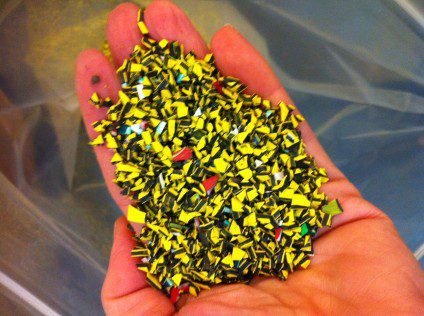
Regrind from cattle ear tags -
December 31, 2012
Body Bags for animals destined to return to hydrocarbons
Tags:I’m working on a show opening at bitforms on Jan 10, some of it from Necrocracy at Diverseworks, and a bit of new work as well also re-approaching our relations with petrochemicals.
The new pieces are animal body bags, made of Tyvek and printed in solvent ink, with folk-art style patterns that upturn, implode, decroate with the drawings I did for the Petroleum Manga – objects of various petrochemical outputs. A dizzying “Latour litany” / ontographic approach with which I feel so… synchronized. The idea is that the bags will get stuffed with petrochemical flotsam, plastics slated for recycling, left behind, or bound quickly for the trash bin.
Here are a couple of photos of work in progress:
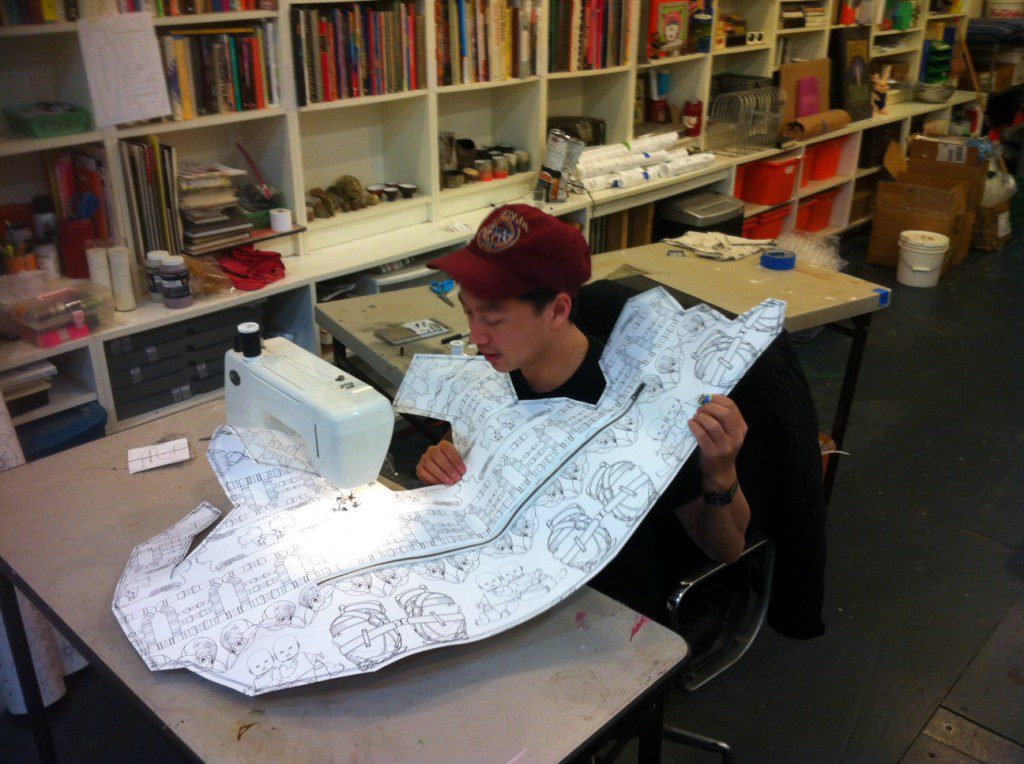
Antonius Wiriadjaja working on constructing a Body Bag for Dogs (Polyethylene Terephthalate / PET) Here are the drawings for the creatures so far:
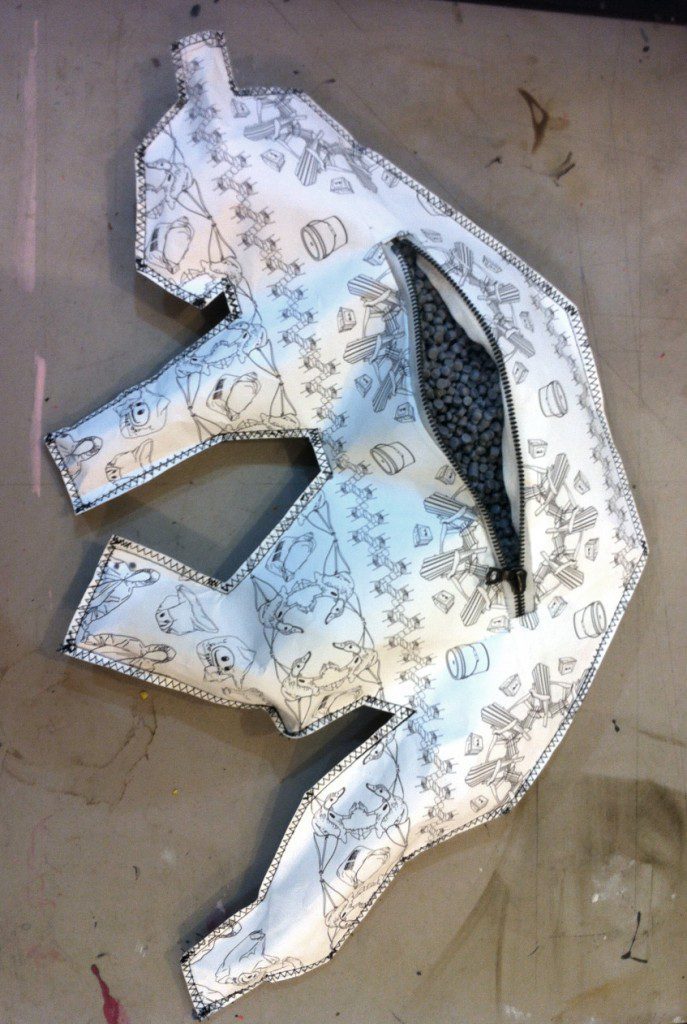
Here is a Body Bag for Cats, unzipped and filled with polyurethane pellets. -
December 26, 2012
Hydrocarbons & You
I’ve started an inventory service to help people determine the depth of their entanglement with hydrocarbons. Stay tuned. If you’d like a survey form, email petrochemsurvey@o-matic.com
I can email you a pdf or you can pick one up at bitforms gallery january 10 – february 16.
-
-
December 8, 2012
My LIfe as a Turkey
Tags:One of my UrbanNature Interventionist students suggested this film – it’s at once shmaltzy, beautifully shot, and umwelt-shifting!
Here’s chapter one, but you can watch the full 50 minute doc at Nature/PBS. It premiered in Nov 2011.
Watch My Life as a Turkey on PBS. See more from Nature.
-
October 5, 2012
OR7
Tags:Knowing more of what I am starting to know, a lone wolf is not a romantic beast. His or her status is a walkabout, but when you walk a territory mainly devoid of potential companion alliances, what is your world like? My heart hurts; I’m not even sure what my own loneliness feels like.
Gray Wolf (Canis lupus)
At this time, there is only one documented gray wolf living in the wild in California.
On Dec. 28, 2011 a 2 ½-year-old, male gray wolf entered California after traveling from northeast Oregon. Designated OR7, his behavior, called dispersal, is not atypical of a wolf his age.
Historically, wolves inhabited California, but were extirpated. Before OR7, the last confirmed wolf in California was here in 1924 and since then, investigated “sightings” have turned out to be coyotes, dogs, wolf-dog hybrids, etc. DFG wildlife managers anticipated that wolves would eventually enter California, and have been preparing for it.
- The State of California is not intentionally reintroducing wolves.
- Gray wolves pose little direct risk to humans.
- Any wolf that enters California is protected as endangered under the federal Endangered Species Act.
DFG provides these maps to show the route that Wolf OR 7 has traveled since his entry into California. The maps will be updated periodically as additional data becomes available. However, there will be an intentional delay in posting new map information to protect the current location of this wolf. This wolf’s movement pattern, in terms of timing, direction and distance has so far been unpredictable. Therefore the maps will provide useful information on where he has been recently, but not where he is now.
- Map of OR7’s path in California (PDF)
This map contains data through July 10, 2012Since July 10, OR7 has remained in the same general areas of Tehama, Plumas and Butte counties. When OR7 makes a significant move to other locations, DFG will update the map. - Updates on Gray Wolf OR7
This is a photo of OR10. Another grey wolf from the Northwest, When this link breaks you will know there is shifted interest or possibly no more interest from California Fish and Wildlife (info source). I decided not to download the picture in order to upload it in a state of frozen preservation but leave it where it lies.

Gray Wolf (OR-10)
Photo courtesy of Oregon Department of Fish and Wildlife.
